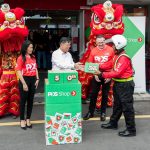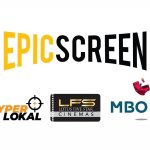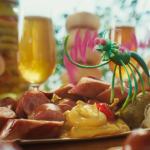As the world went space crazy after the lunar landing in 1969, New Zealand ad gurus were quick to capitalise on the historic moment.
In the days after the July 20 touchdown, newspapers carried a number of moon-themed advertisements for local, national and international brands.

New Zealand Railways congratulated the three astronauts and called the mission a “magnificent breakthrough for mankind”.
In the ad, the government-controlled train service claimed they “can’t match a moon landing” but they could “convey earthlings by their various terrestrial travel services to practically everywhere in New Zealand”.
Supermarket chain Four Square commissioned two Apollo-inspired ads. The first said savings were “not once in a Blue Moon” and featured tins of Watties chicken soup for 21c and bars of Lux soap for 11c.
The second showed the famous Four Square character, Cheeky Charlie, standing on the moon in a spacesuit.

SuperValue took out a full-page advert to announce its “down to earth prices”, with savings on shampoo, Milo and marmalade.
Haines Motors said “the sky’s the limit” and wished “those valiant men success in man’s greatest adventure”.
“This time the Moon, next time Mars,” it said, optimistically.

Ekant Veer, Associate Professor of Marketing at University of Canterbury, said the ads were an excellent reflection of how marketers and advertisers tapped into a global zeitgeist to connect with their target audience.
“These ads offer a fascinating historical perspective on how our lives were at the time,” he said.
“When potentially the whole world is talking about a specific topic then anything that can fit into that narrative is going to catch people’s eyes and draw some interest.”

Specialty items also went on release to coincide with the Apollo 11 mission.
Redferns, of Manchester St in Christchurch, offered a planisphere, a 27-inch Moon map and a 12-inch diameter lunar globe.
According to the advertisement, the “accurate” model could be used for astronomy and decoration and featured the mountains and ranges found on the Moon’s surface.

Another SuperValue ad promised shoppers a free souvenir of the “Moon flight”.
The “exclusive” envelopes were available at supermarkets across Christchurch but were limited to one per customer.
“These envelopes will become a valued memento for the future,” the advertisement proclaimed.
“Due to limited printing, distribution will be confined to one free envelope to each of the first thousand shoppers.”

An advert for International Harvester Company of NZ told how its “reliability contributes to Moon exploration”, as IH-Solar, a division of the company, manufactured components for NASA’s Saturn V rocket during the Apollo missions.
A provocative Smirnoff ad asked Kiwi readers if they had ever tried the famous drink.
Featuring a female cosmonaut holding a vodka-on-the-rocks, the image was published at the height of the Cold War.
With Apollo 11, America had won the Space Race and behind the sultry smile, the Smirnoff ad could have been a knowing nod to the geo-politics of the day.

“None of this is all that unusual when we take a consumer psychology approach to understanding advertising effects,” Veer said.
“People don’t just want a ‘thing’ they want to feel part of a collective and products that enable this will draw people’s attention. We will see more All Blacks advertising on products in the lead-up to the World Cup, for example. It’s commonplace because it’s so effective.”
source: http://www.stuff.co.nz
MARKETING Magazine is not responsible for the content of external sites.











